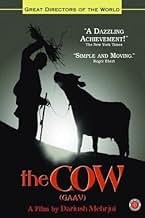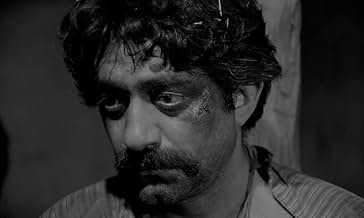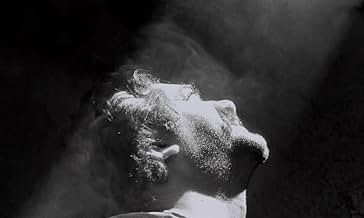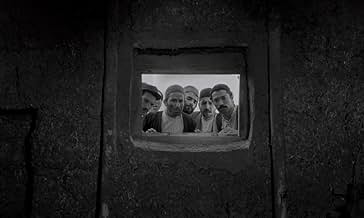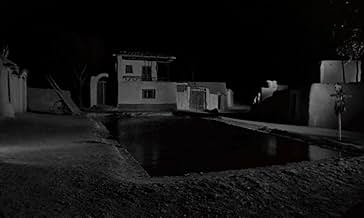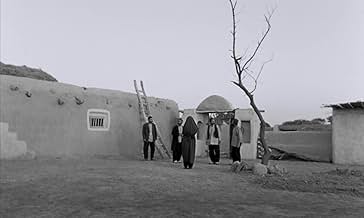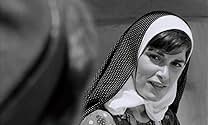CALIFICACIÓN DE IMDb
7.8/10
8.4 k
TU CALIFICACIÓN
Un anciano aldeano profundamente enamorado de su vaca viaja a la capital durante un tiempo. Una vez allí, la vaca muere y los aldeanos temen por su reacción cuando vuelva.Un anciano aldeano profundamente enamorado de su vaca viaja a la capital durante un tiempo. Una vez allí, la vaca muere y los aldeanos temen por su reacción cuando vuelva.Un anciano aldeano profundamente enamorado de su vaca viaja a la capital durante un tiempo. Una vez allí, la vaca muere y los aldeanos temen por su reacción cuando vuelva.
- Dirección
- Guionistas
- Elenco
- Premios
- 2 premios ganados y 1 nominación en total
- Dirección
- Guionistas
- Todo el elenco y el equipo
- Producción, taquilla y más en IMDbPro
Opiniones destacadas
This simple tale is open to interpretation, which can be considered positively or otherwise it perhaps hearkens back to folk tales which are passed down orally, and contain simple plots which are then the basis of discussion. In this way it is easily remembered and its meanings can be deciphered afterwards by those who watch it. However it also means that the film seems overlong for the most part, pre-occupied with repeating sequences and behaviour again and again, and even drawing out the fairly dramatic ending which arguably diminishes its strength. Perhaps it would have been better presented in a shorter runtime, or a more heavily stylised manner such as that of the title sequence. Nevertheless, regardless of enjoyment there are many threads of discussion that can be considered.
One of the key questions raised by the film is that of the mental stability of the protagonist, Hassan, whose loss of his animal will bring about his somewhat metamorphosis into the same creature. At the start of the film he is seen behaving extremely strangely as he leads his cow back to town, exultantly dancing around it as he washes and caresses it. This man is not behaving as the other people (such as the children) do. Hassan is mirrored somewhat by the town idiot, who is berated by the other people, and even locked up so as to keep Hassan himself from learning the secret of his cow's death. This mirroring, and Hassan's transformation, make it possible to consider the village's relationship to both Hassan and his cow certainly throughout neither are treated with respect, and the film's end highlights this.
Perhaps Mehrjui, the film's creator, comments on the actual importance of the cow and this man's relationship, an idea that is supported by the title of the piece.
One of the key questions raised by the film is that of the mental stability of the protagonist, Hassan, whose loss of his animal will bring about his somewhat metamorphosis into the same creature. At the start of the film he is seen behaving extremely strangely as he leads his cow back to town, exultantly dancing around it as he washes and caresses it. This man is not behaving as the other people (such as the children) do. Hassan is mirrored somewhat by the town idiot, who is berated by the other people, and even locked up so as to keep Hassan himself from learning the secret of his cow's death. This mirroring, and Hassan's transformation, make it possible to consider the village's relationship to both Hassan and his cow certainly throughout neither are treated with respect, and the film's end highlights this.
Perhaps Mehrjui, the film's creator, comments on the actual importance of the cow and this man's relationship, an idea that is supported by the title of the piece.
In the small village where he lives, Masht Hassan is well-known because he owns the only cow. Needless to say he is very protective of the animal and treats it like the child he and his wife do not have bathing, feeding and playing with it; his main worry is that the neighbouring Boulouris will come in the night and steal it away. However while he is away one day, the cow starts to bleed from the nose and die faced with having to tell him it is dead, the villagers bury the body and agree to tell him it has strayed. When Hassan returns he cannot believe it and soon is spending nights on the roof of the barn waiting for it to return, part of a gradual spiral downwards with no end Considered to be one of the landmark films in the history of Iran as a force as a film producing nation, this will be a harder sell to Western audiences (myself included) who perhaps cannot understand the context of the story and some of the deeper meaning that, I assume, this story has. The plot is simple and it seems to show the mental decline of Hassan and the village's collective inability to deal with that within the confines of daily life. In painting a realistic picture of village life (the film was shot using a mix of actors and real villagers) the film maintains an interesting setting even if the development is rather slow and unsatisfying. It requires you to think of course, but I didn't think I had the knowledge to really appreciate it and I suspect that many other viewers will struggle for the same reason.
The stark direction is good but I'm not sure if it suited the material as I would have preferred a washed out colour to compliment the sentiment in the film. It worked though and the performances are mainly good Entezami in particular convincing in his slide into instability. Worth seeing because of its stature within Iranian cinema then, but perhaps you need a greater understanding of the culture than I if you are to take more from it. Even still it is interesting in its view of village life and the attitude towards mental illness.
The stark direction is good but I'm not sure if it suited the material as I would have preferred a washed out colour to compliment the sentiment in the film. It worked though and the performances are mainly good Entezami in particular convincing in his slide into instability. Worth seeing because of its stature within Iranian cinema then, but perhaps you need a greater understanding of the culture than I if you are to take more from it. Even still it is interesting in its view of village life and the attitude towards mental illness.
this film from 1960s and we should attend this masterpiece about a man and his life his problems his troubles we can discuses about influence of this film on thinking of people about human and all around things we can discuss about importance this movie to in Iranian cinema in 40 years ago and it director and actors are some of best of cinema history this film from 1960s and we should attend this masterpiece about a man and his life his problems his troubles we can discuses about influence of this film on thinking of people about human and all around things we can discuss about importance this movie to in Iranian cinema in 40 years ago and it director and actors are some of best of cinema history
The Cow, Gaav (1969) is the second feature film by director Dariush Mehrjui. It was the second film to be financed by the Shah of Iran but promptly banned after completion when the Shah felt its portrayal of simple village life in Iran gave the wrong impression to outsiders. The film was smuggled out of Iran in 1970, and subsequently won "critics choice" at the Venice Film Festival.
The Cow (originating from a novel by Iranian author Gholam-Hossein Saedi) portrays the obsession, loss of faith and demise of a poor rural village that loose their single salable commodity - a cow. Hassan, played by Ezatollah Entezami (who received best actor at the Chicago Film Festival), has a face that vividly captures his physical and emotional change after a breakdown when he becomes the cow. Mehrjui uses theater actors with "compelling faces" as key elements in the cinematography (Feridun Ghovanlu), as did the Italian Neo-realist.
The film explores the looming fear of a foreign invader as the villagers come to believe Hassan, in his cow-like state, will be captured in cross-border raids from rival tribes. Politically this is reminiscent of the Shah's constant allusions to the neighboring "Arab threat" over oil.
While set in traditional, rural Iran, Mehrjui shows an alternative view of Iran where collective fear and poverty can cycle in hopeless desperation. Viewers of The Cow are left to question the very root of human dignity.
The Cow (originating from a novel by Iranian author Gholam-Hossein Saedi) portrays the obsession, loss of faith and demise of a poor rural village that loose their single salable commodity - a cow. Hassan, played by Ezatollah Entezami (who received best actor at the Chicago Film Festival), has a face that vividly captures his physical and emotional change after a breakdown when he becomes the cow. Mehrjui uses theater actors with "compelling faces" as key elements in the cinematography (Feridun Ghovanlu), as did the Italian Neo-realist.
The film explores the looming fear of a foreign invader as the villagers come to believe Hassan, in his cow-like state, will be captured in cross-border raids from rival tribes. Politically this is reminiscent of the Shah's constant allusions to the neighboring "Arab threat" over oil.
While set in traditional, rural Iran, Mehrjui shows an alternative view of Iran where collective fear and poverty can cycle in hopeless desperation. Viewers of The Cow are left to question the very root of human dignity.
"The cow" (1969) from Dariush Mehrjui can be called (with a little exaggeration) the founding film of Iranian (art house) cinema. In an interview Mehrjui told that the Italian neorealists were his big examples in making this film.
Dariush Mehrjui was born in 1939. He is therefore a contemporary of Bahram Beizai (born 1938) and Abbas Kiarostami (born 1940). Nevertheless Mehrjui is THE director of Iran before the Islamic Republic of 1979.
"The cow" tells the story of a man losing his only cow. Caring for this cow was the cornerstone of his life and the source of his status in the village. The theme of the film is the reaction of the man to his misfortune and the way the villagers cope with his reaction.
In this time of professional psychiatric treatment maybe there is something to be learn from the degree of involvement of the villagers with their neigbour. Hoewever the schocking final scene shows what can happen when involvement turns into powerlessness.
Apart from the man with the cow there are a lot of other things happening in the village. They are hinted at, but we can not speak of elaborated sub-plots. There is for example a couple in love probing every opportunity to be together unnoticed. The glances they exchange speak for themselves. After all this film was made before the Islamic revolution of 1979.
Dariush Mehrjui was born in 1939. He is therefore a contemporary of Bahram Beizai (born 1938) and Abbas Kiarostami (born 1940). Nevertheless Mehrjui is THE director of Iran before the Islamic Republic of 1979.
"The cow" tells the story of a man losing his only cow. Caring for this cow was the cornerstone of his life and the source of his status in the village. The theme of the film is the reaction of the man to his misfortune and the way the villagers cope with his reaction.
In this time of professional psychiatric treatment maybe there is something to be learn from the degree of involvement of the villagers with their neigbour. Hoewever the schocking final scene shows what can happen when involvement turns into powerlessness.
Apart from the man with the cow there are a lot of other things happening in the village. They are hinted at, but we can not speak of elaborated sub-plots. There is for example a couple in love probing every opportunity to be together unnoticed. The glances they exchange speak for themselves. After all this film was made before the Islamic revolution of 1979.
¿Sabías que…?
- TriviaFinanced largely by the Shah's government, the producers were aghast at the finished film as they felt that it made Iran look like it was a completely backwards country. The film was only allowed to be released with a disclaimer attached stating that the events depicted happened long before the then existing regime.
- ErroresWhen a woman goes to Mash Hassan to get milk, a man tells her that one cow is all they have in the village. This should be impossible because a female cow cannot get pregnant on her own and lactate.
- Citas
Masht Hassan: I'm not Hassan. I'm his cow.
- ConexionesFeatured in Cinema Iran (2005)
Selecciones populares
Inicia sesión para calificar y agrega a la lista de videos para obtener recomendaciones personalizadas
- How long is The Cow?Con tecnología de Alexa
Detalles
- Tiempo de ejecución1 hora 44 minutos
- Color
- Mezcla de sonido
- Relación de aspecto
- 1.37 : 1
Contribuir a esta página
Sugiere una edición o agrega el contenido que falta

Principales brechas de datos
By what name was Gaav (1969) officially released in Canada in English?
Responda
